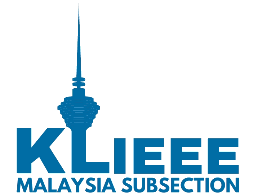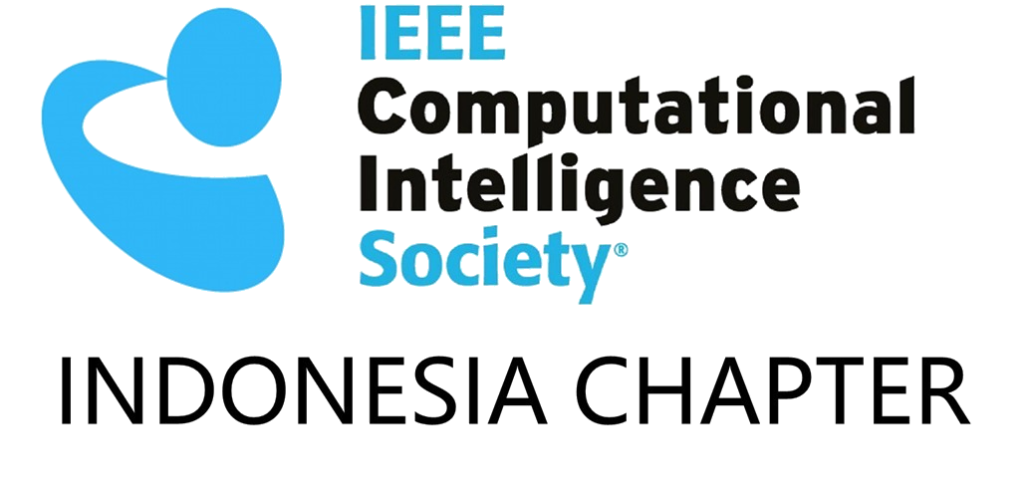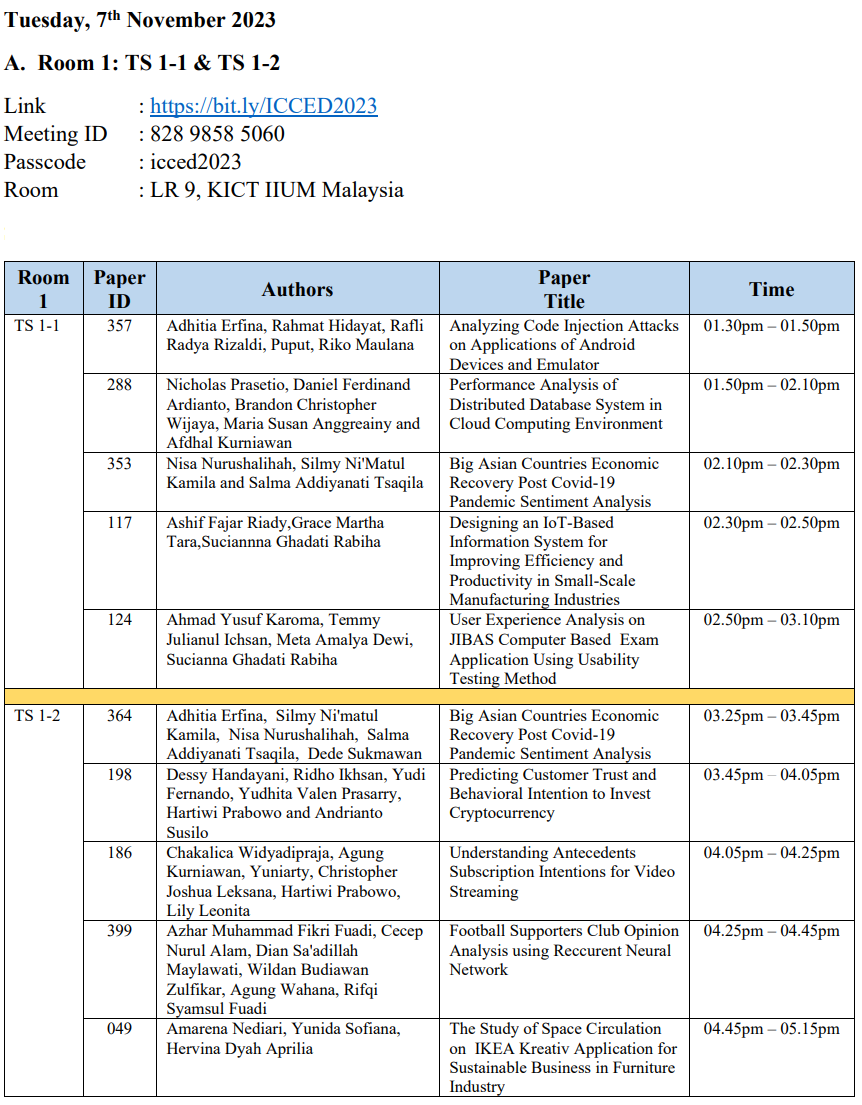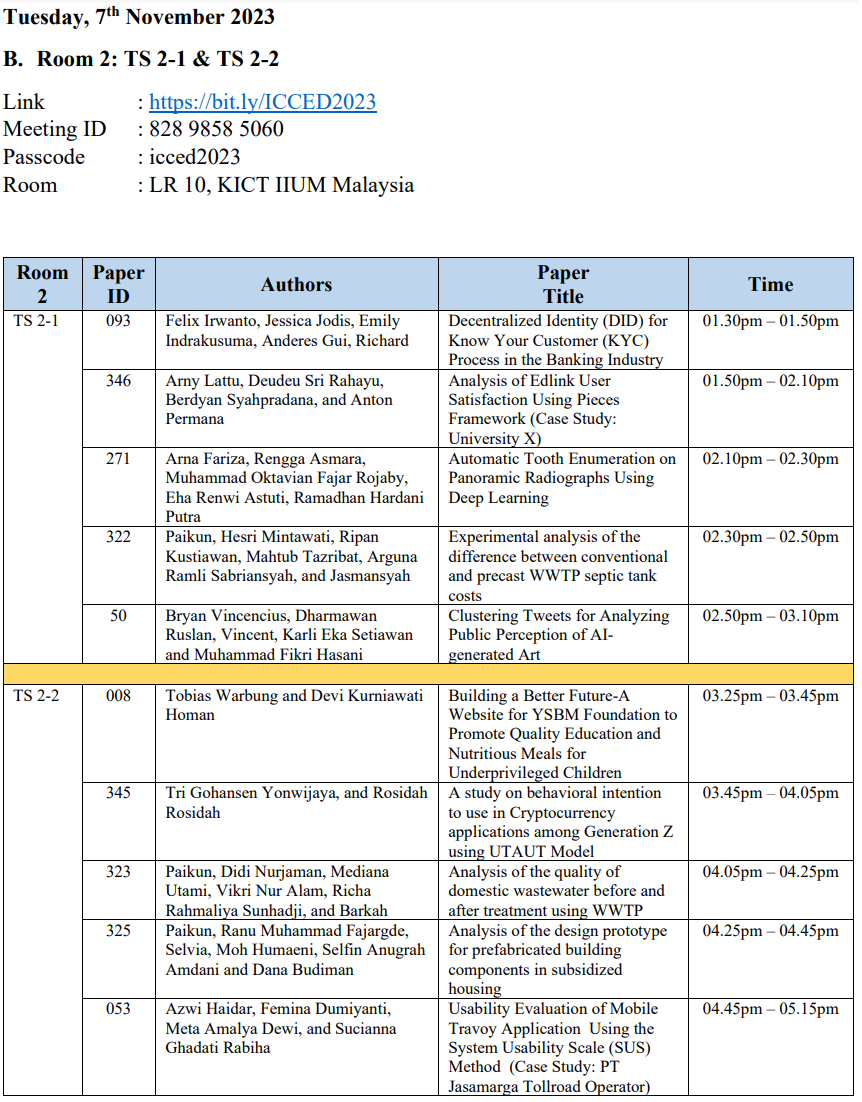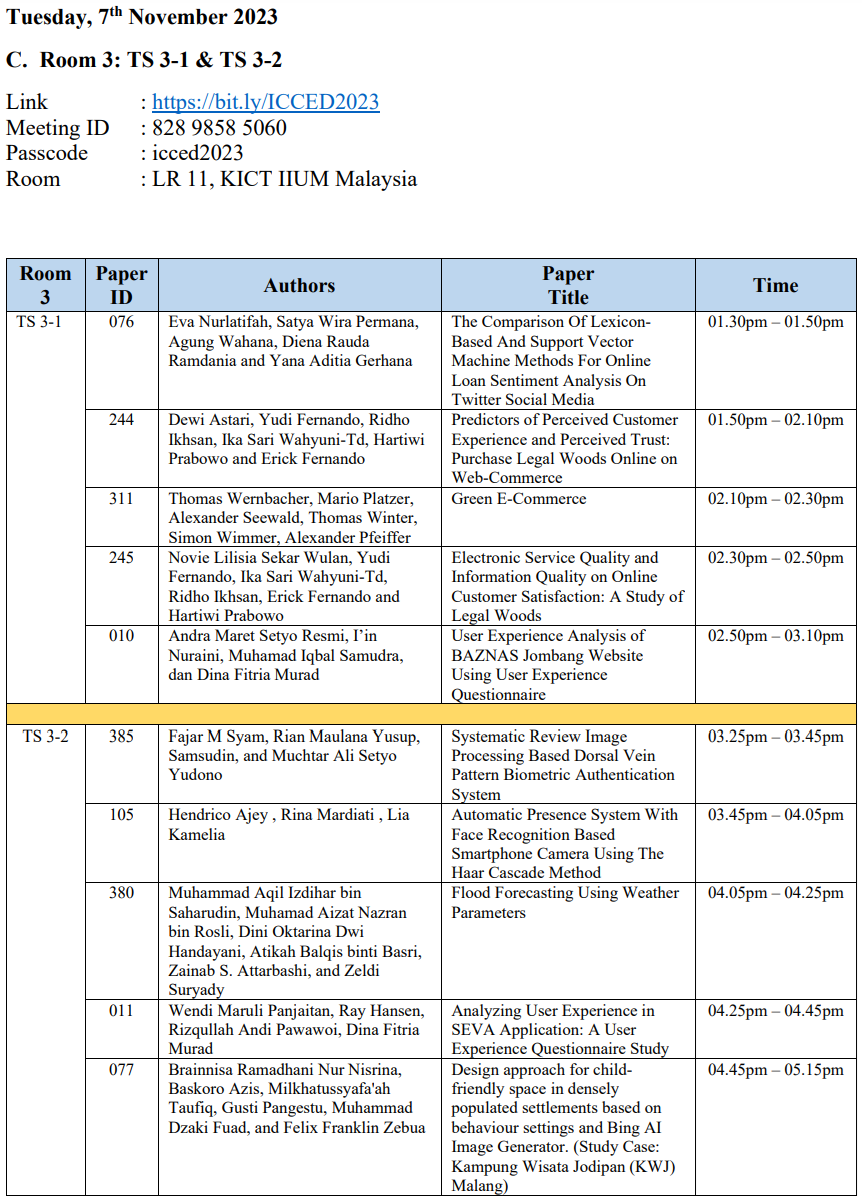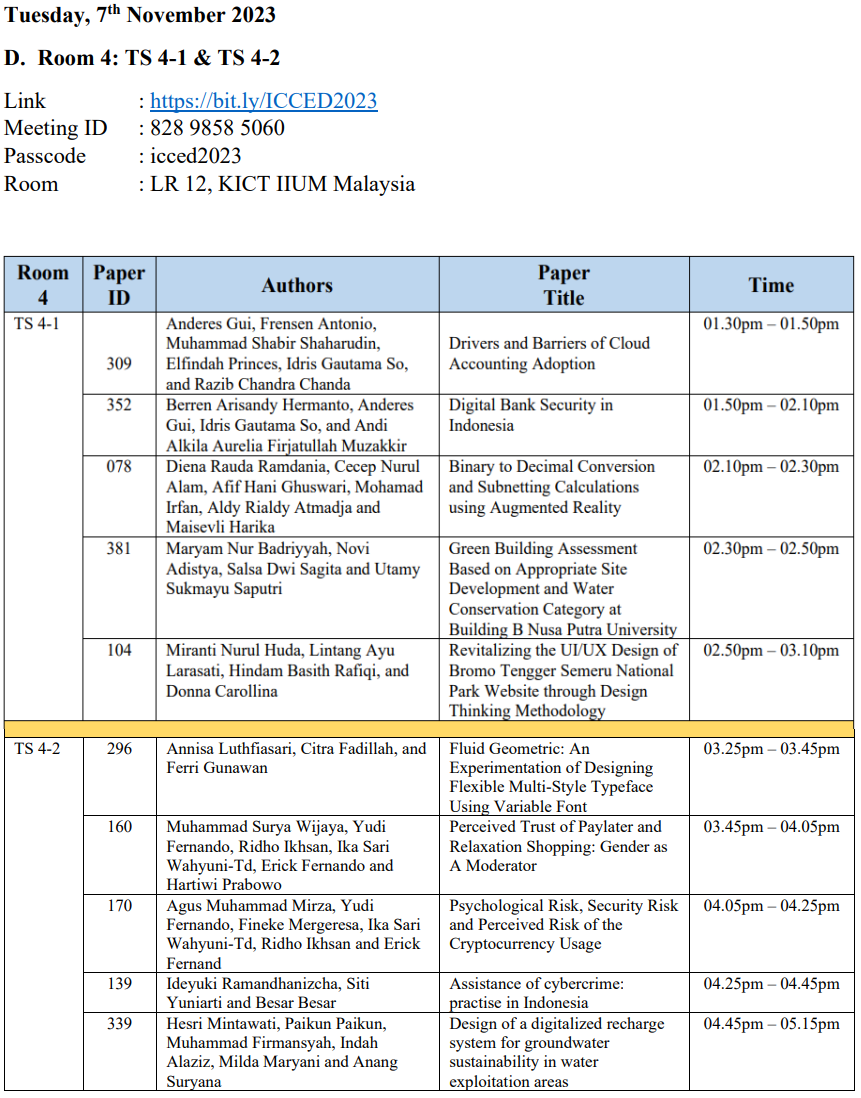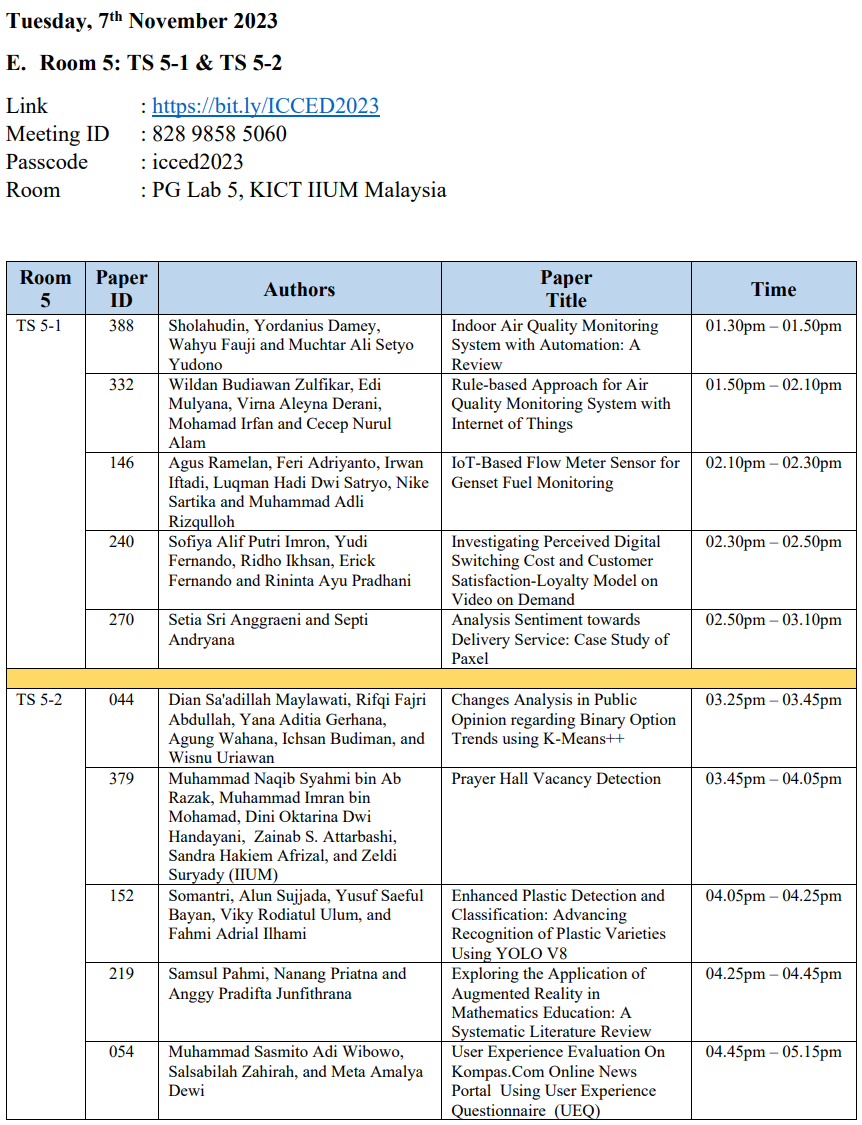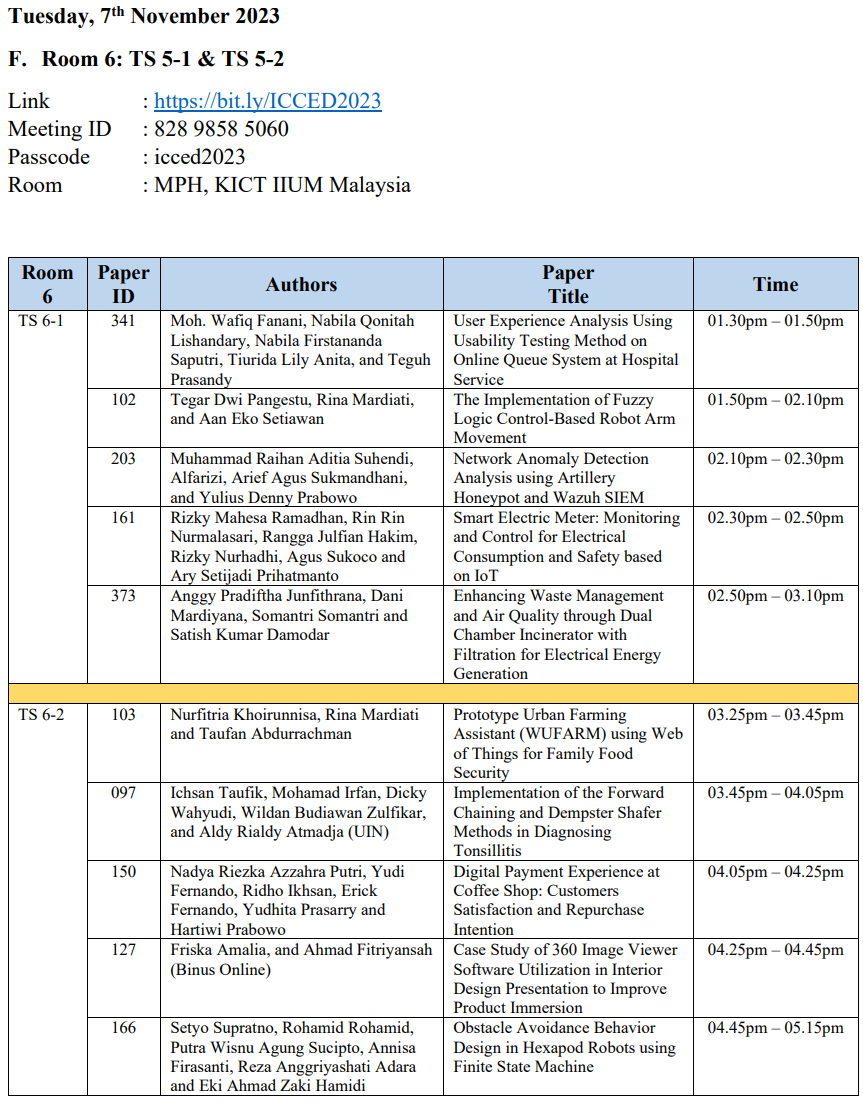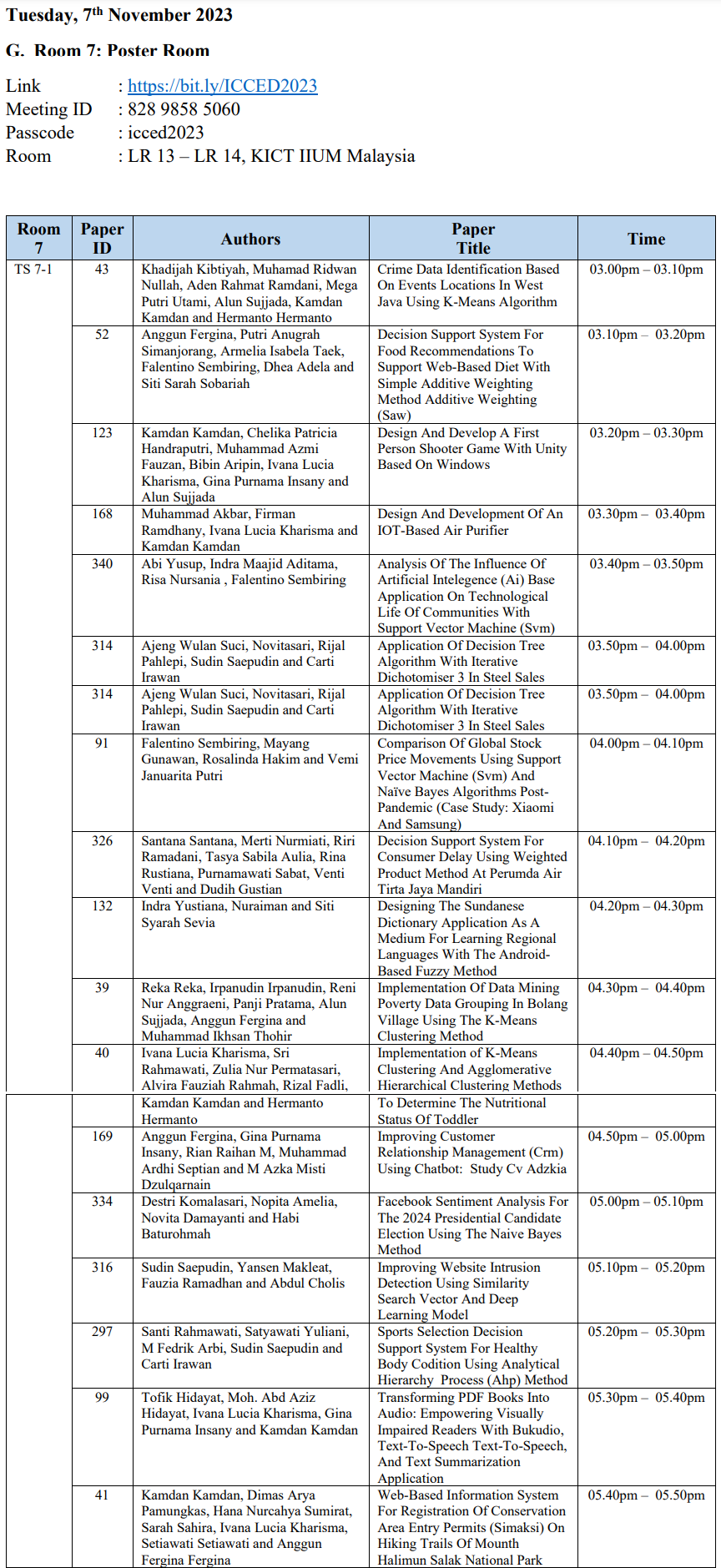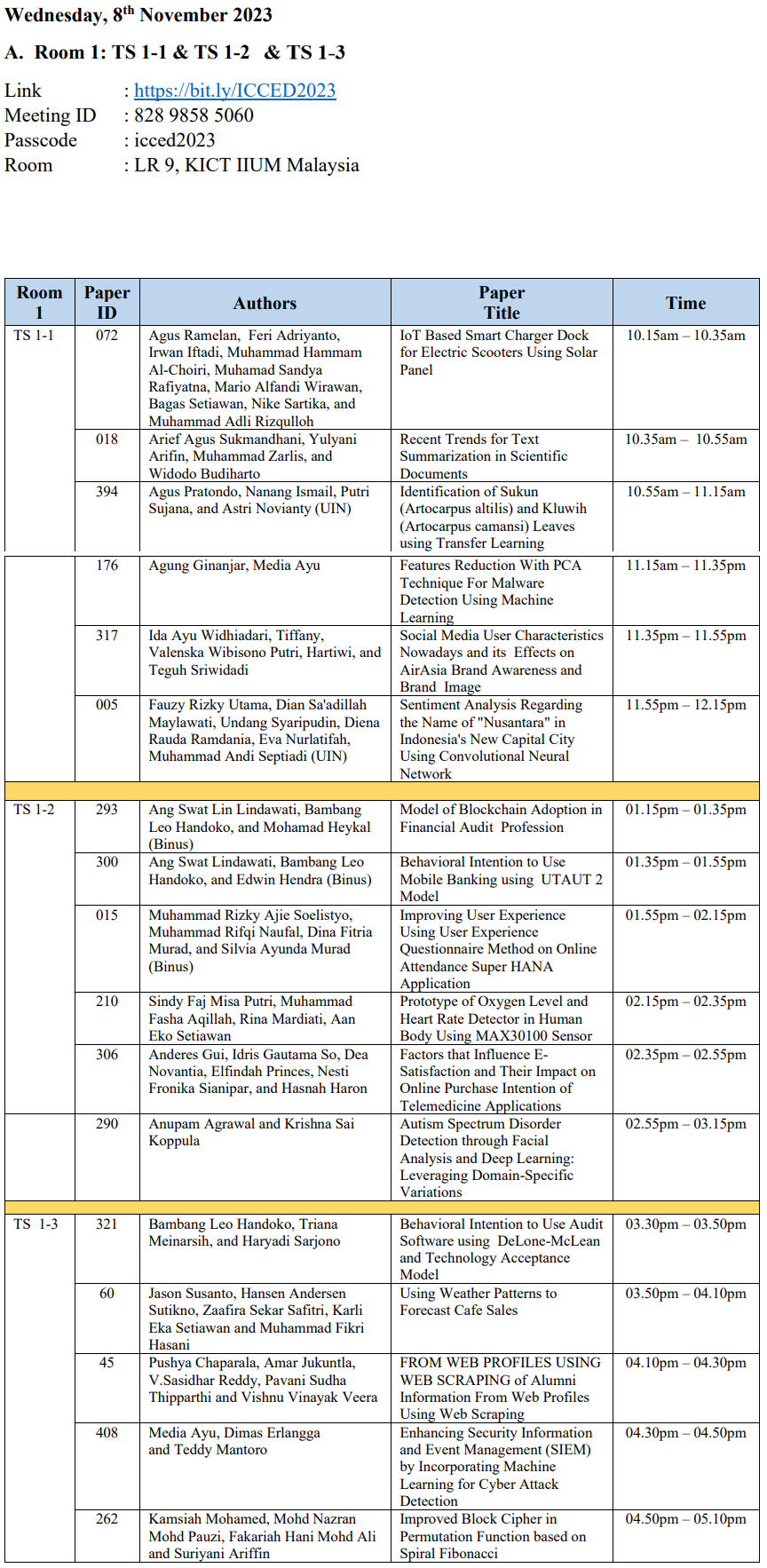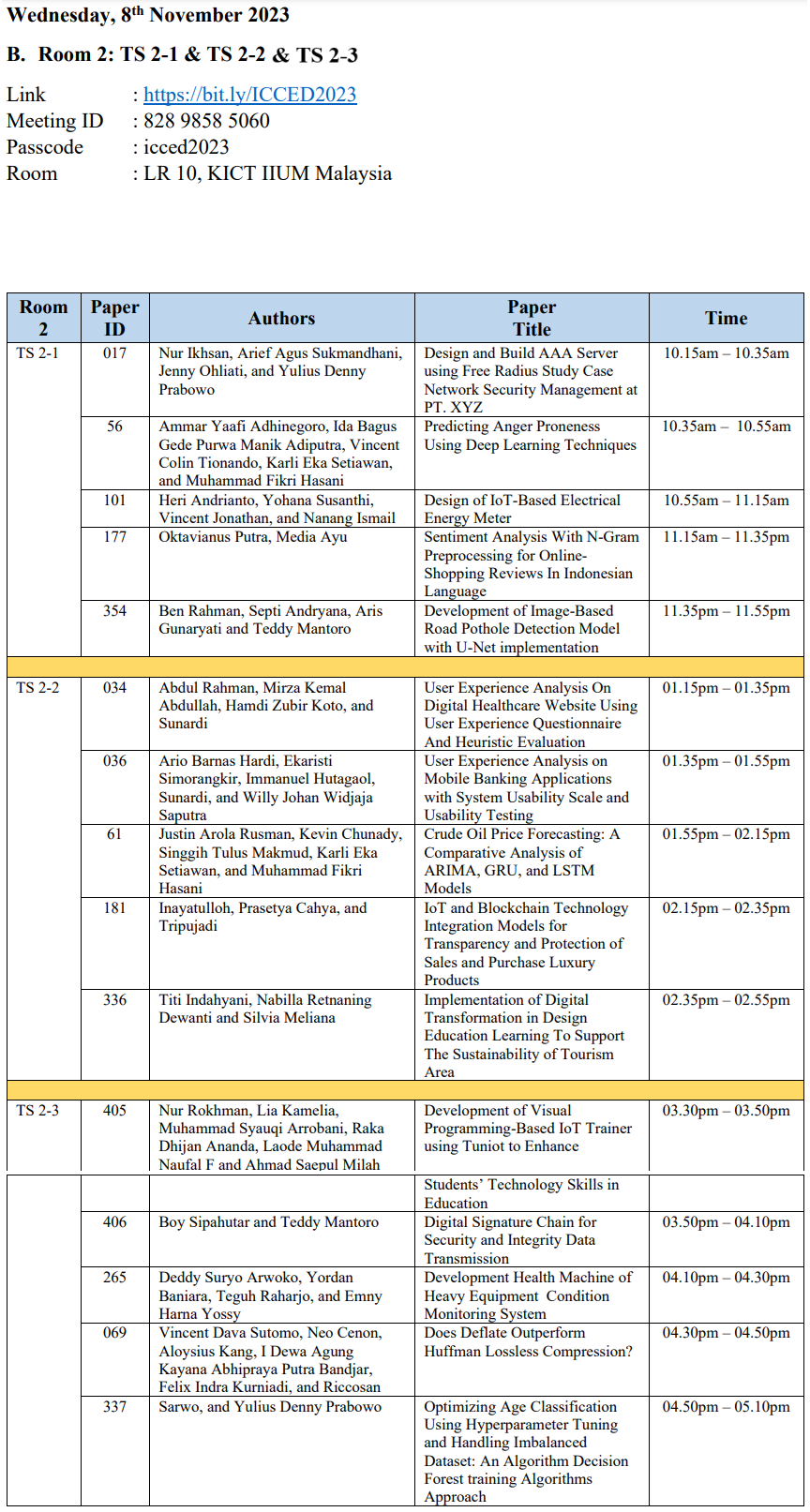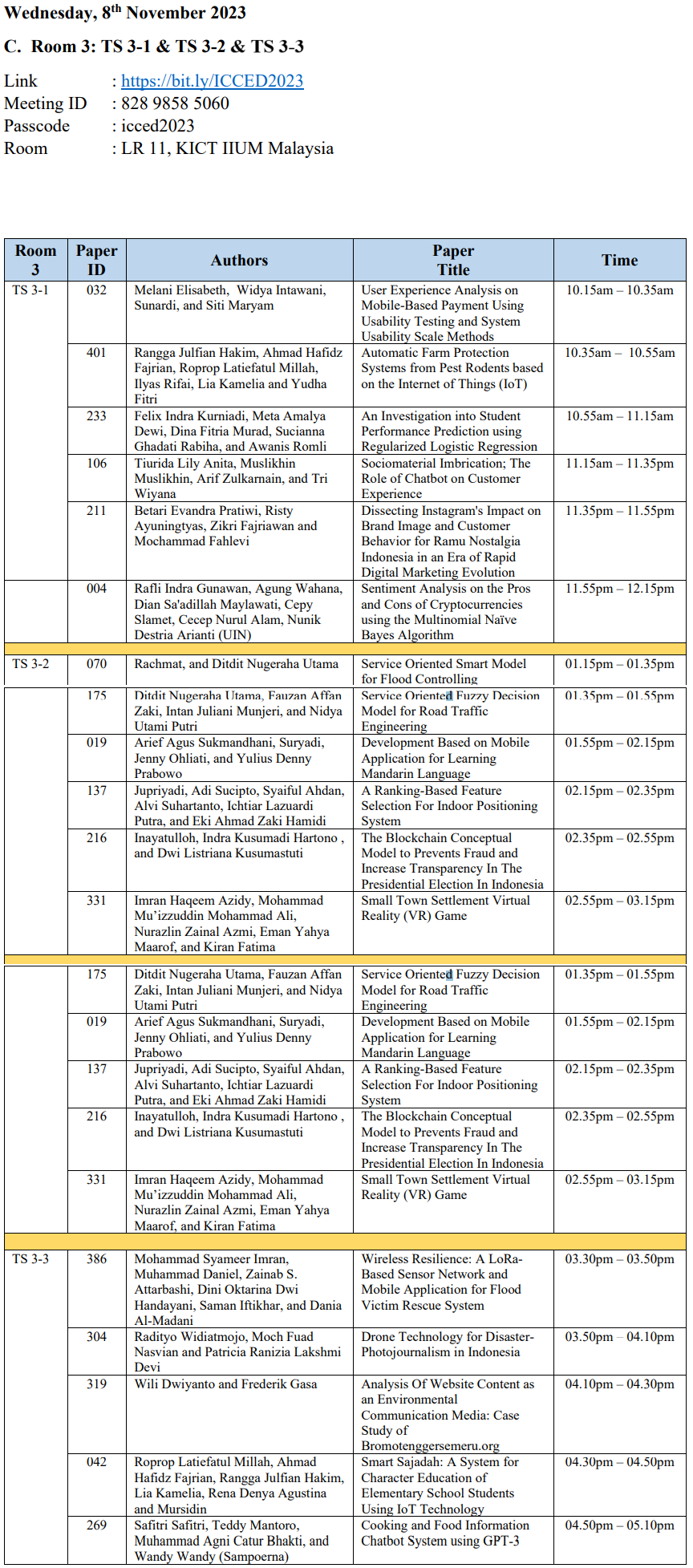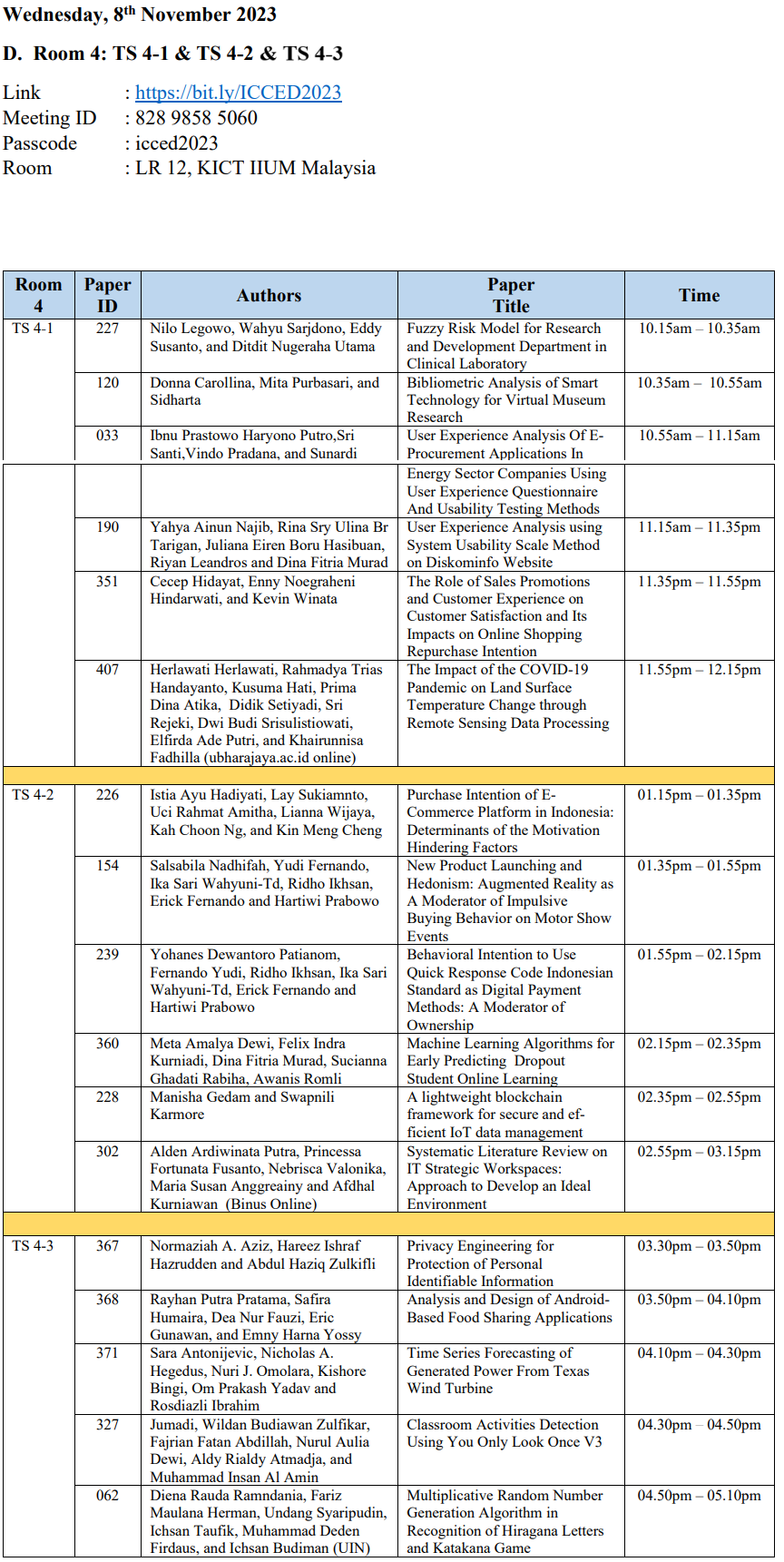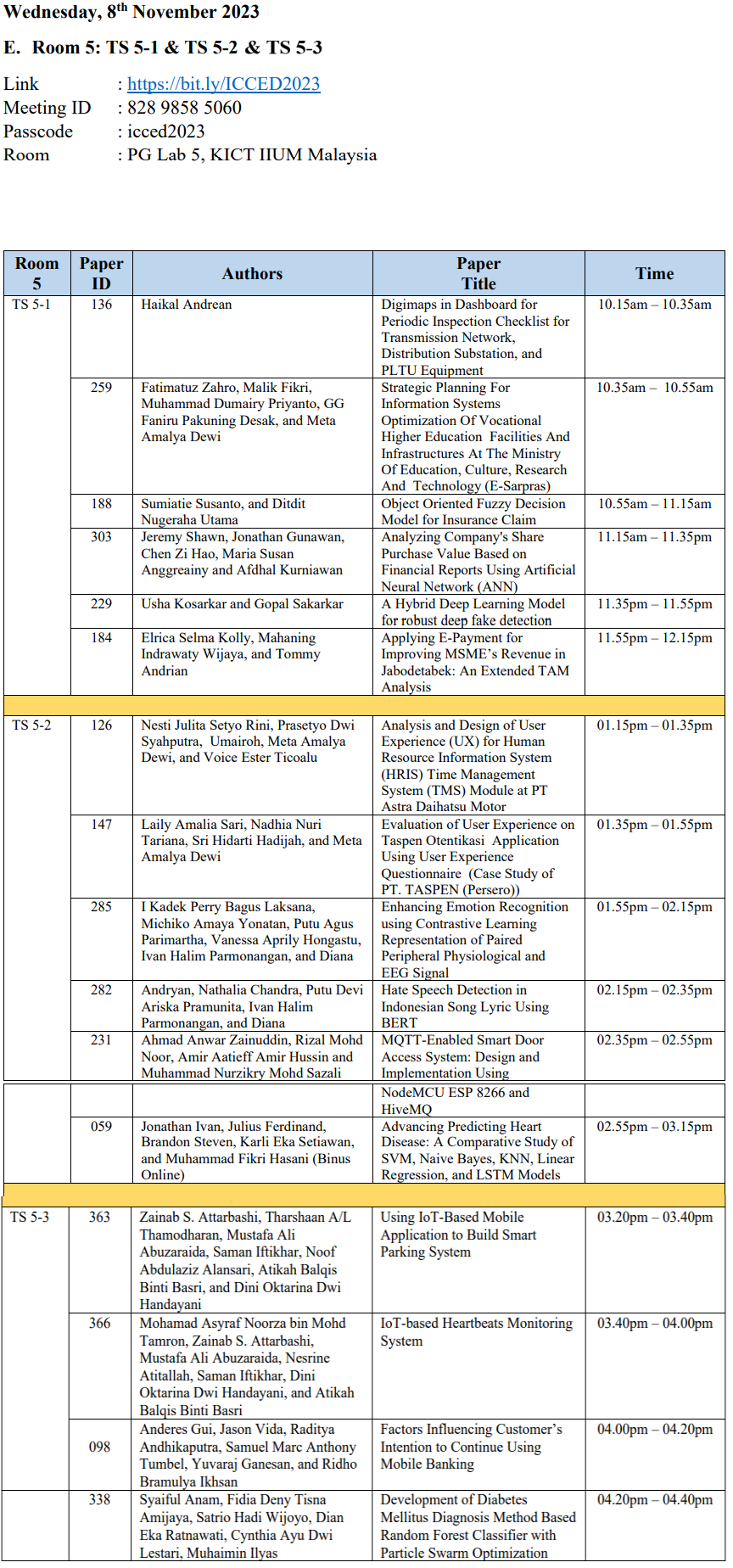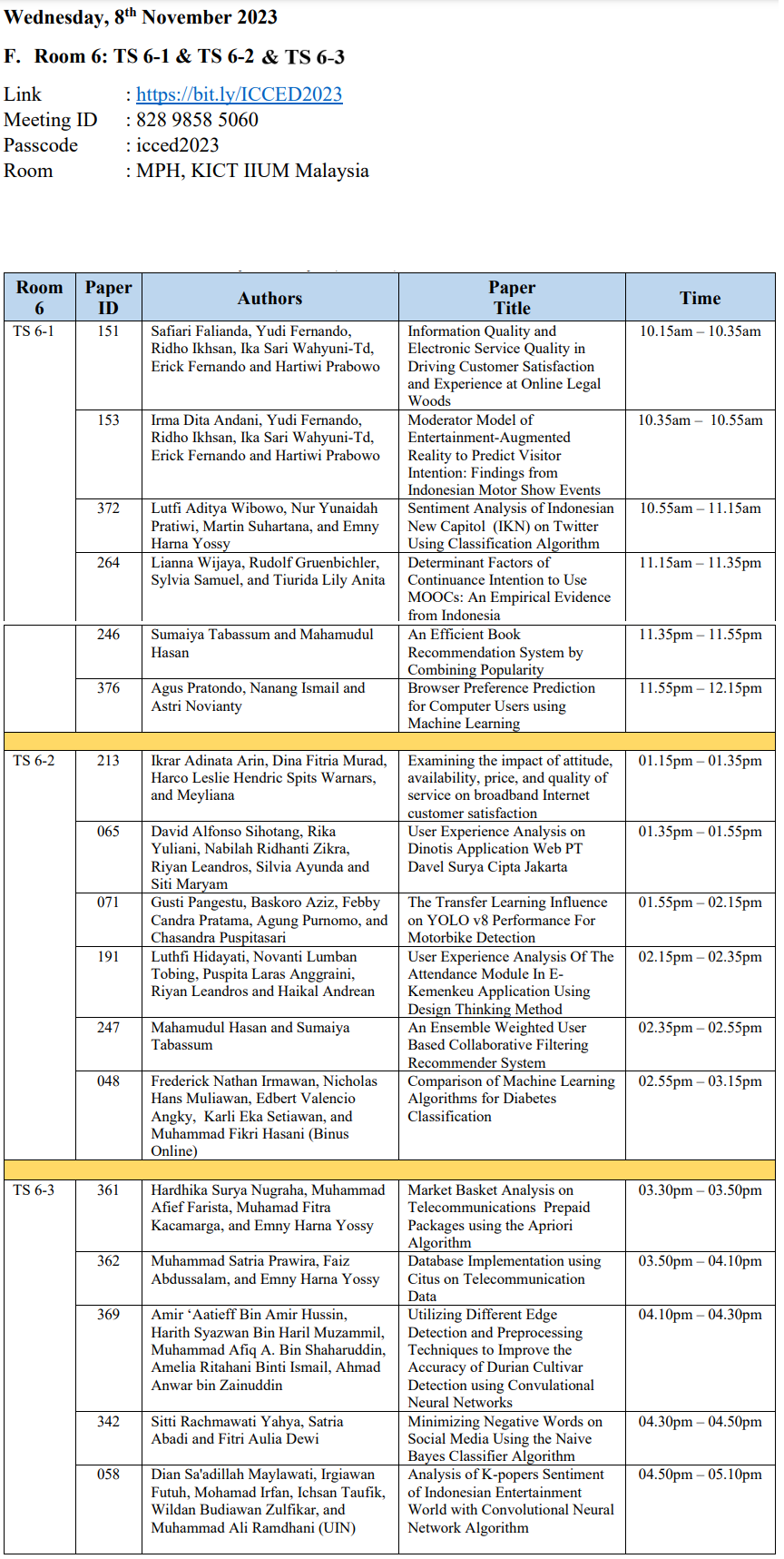
9th ICCED 2023
International Conference on Computing, Engineering, and Design
"Generative AI for Engineering and Design: Bridging Creativity and Efficiency"
kuala lumpur - Malaysia, 7-8 November 2023
- 00Days
- 00Hours
- 00Minutes
Previous Conference
- ICCED 2022:
Website: https: http://icced.nusaputra.ac.id/icced2022
IEEE Xplore: https://ieeexplore.ieee.org/xpl/conhome/10009906/proceeding - ICCED 2021:
Website: https: http://icced.nusaputra.ac.id/icced2021
IEEE Xplore: https://ieeexplore.ieee.org/xpl/conhome/9664749/proceeding - ICCED 2020:
Website: http://icced.nusaputra.ac.id/icced2020
IEEE Xplore: https://ieeexplore.ieee.org/xpl/conhome/9415749/proceeding - ICCED 2019:
Website: http://icced.nusaputra.ac.id/2019
IEEE Xplore: https://ieeexplore.ieee.org/xpl/conhome/9153549/proceeding - ICCED 2018:
Website: http://icced.nusaputra.ac.id/2018
IEEE Xplore: https://ieeexplore.ieee.org/xpl/mostRecentIssue.jsp?punumber=8672745 - ICCED 2017:
Website: http://icced.nusaputra.ac.id/2017
IEEE Xplore: http://ieeexplore.ieee.org/xpl/mostRecentIssue.jsp?punumber=8303176
Call For Papers
Computing
- Smart Embedded Computing
- Computer System & Networking
- Data Science/Analytics
- E-Commerce & E-Business
- Educational Computing
- Green Computing
- Intelligent systems & Robotics
- IS Project Management
- IT and social change
- Smart Technology
- Internet of things
- Data analytics for Big Data
- Business Information Systems
- Intelligent system for organizations
- Health Information Systems
- Information security
- Software Engineering
Engineering
- Bioprocess Engineering
- Chemical Engineering
- Civil Engineering
- Electrical Engineering
- Computer Engineering
- Energy Engineering
- Environmental Engineering
- Food Engineering
- Geotechnical Engineering
- Genetic Engineering
- Industrial Engineering
- Manufacturing Engineering
- Materials Engineering
- Mechanical Engineering
- NanoEngineering
Design
- Visual Communication Design
- Digital art
- Photography
- Graphics, Art, and Design
- Visual literacy
- Visual representation
- Advertising design
- Communication Technologies
- Theory of Perception
- Human-Computer Interaction
- User Experience
- User-based Design
Important Dates
PHASE 1
PHASE 2
PROGRAM SCHEDULE
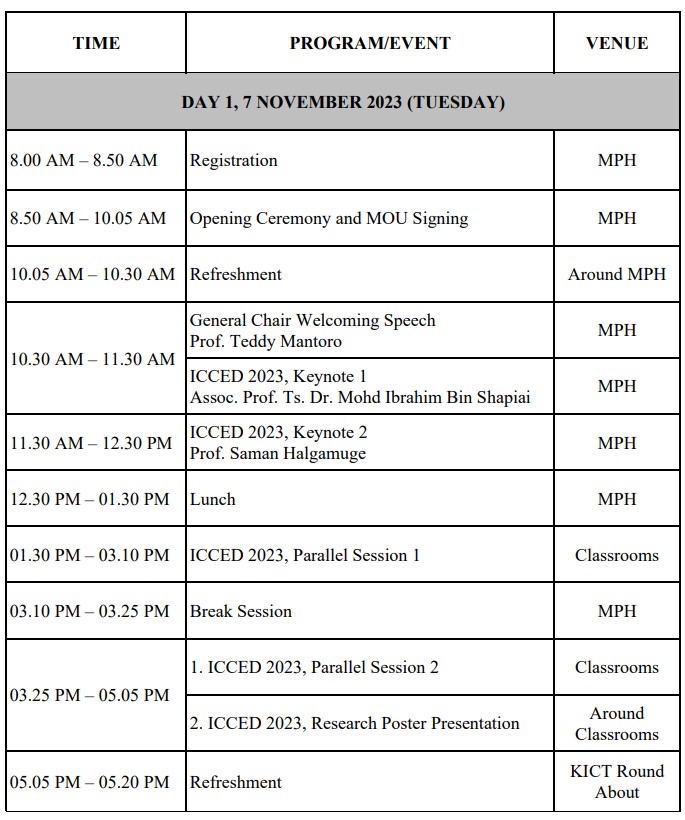
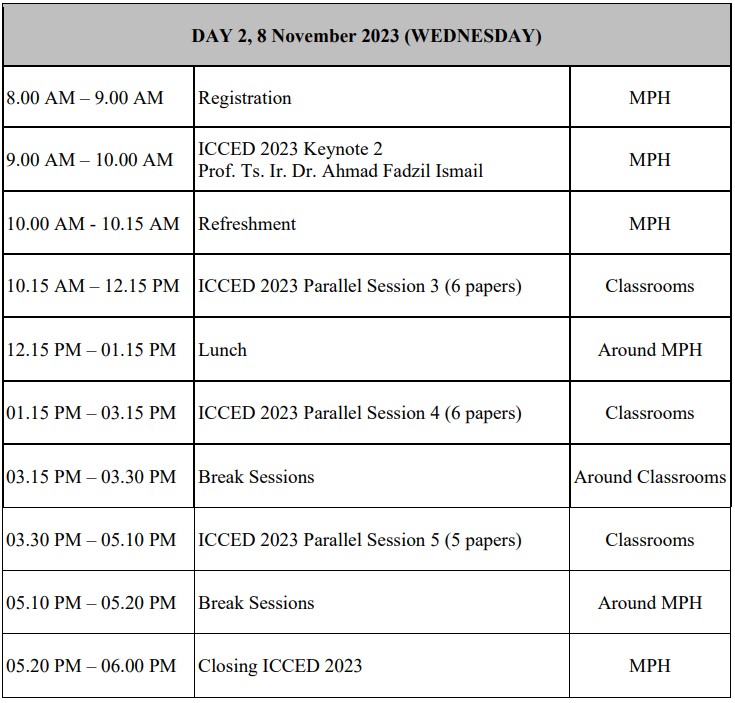
Technical Session Detail
Paper Submission
Submission Format:
Submitted papers should follow IEEE format for conference papers. Papers should be typeset using 11-point or larger fonts, in a two-column, with ample spacing throughout and at least 1-inch margins all around. The title page of each submission should contain the title of the paper; each authors name, affiliation, and email address; and a short abstract summarizing the contributions of the paper. The full papers shall have a minimum of 4 pages and a maximum of 6 pages. Additional page(s) will be charged for $100 per page.
This should be followed by the body of the paper. Papers not adhering to the requirements on font size and margin length may be rejected summarily. To make things easier, please kindly use the A4 template from this IEEE link to be followed and used in formatting your paper.
Templates are available here: IEEE Template
Camera Ready Preparation:
If your paper gets accepted, it will not be published in our proceedings unless the following are done:
- Revise your paper(s) according to the reviewers’ comments. We strongly request you to incorporate and attend reviewers’ feedbacks to improve your paper since IEEE will do another checking/review prior to its inclusion in IEEEXplore and further possible indexing by Scopus.
- The accepted similarity score is maximum 20% as indicated in similarity check software.
- Format your camera paper as per guidelines and follow strictly the A4-IEEE format in pdf file by creating it using IEEE pdf Express.
- send your camera ready paper to https://s.id/form-icced23 by 11 October 2023
- You are also going to be contacted through email by IEEE to complete e-copyright of your paper.
The conference id you can use the ID number 60214X for PDF Express purpose.
Submission Instruction:
Authors are required to submit their papers electronically in PDF (without security restrictions on copying or printing)
Submit your paper to Easy Chair by Following this Link : https://easychair.org/conferences/?conf=icced202https://s.id/form-icced22
Registration
| International Participant | Status | Early bird Payment | Regular Payment | |
| Presenter | IEEE Member | USD 300 | USD 325 | |
| Non IEEE Member | USD 350 | USD 375 | ||
| Poster | USD 200 | USD 250 | ||
| Student Presenter | USD 275 | USD 300 | ||
| Audience/Guest | USD 100 | USD 125 | ||
| Affiliation with Indonesian institution/IIUM | Status | Early bird Payment | Regular Payment | |
| Presenter | IEEE Member | IDR 3.000.000/RM 900 | IDR 3.250.000 / RM 1000 | |
| Non IEEE Member | IDR 3.500.000 / RM 1100 | IDR 3.750.000 /RM 1200 | ||
| Poster | IDR 2.000.000 /RM 600 | IDR 2.500.000 /RM 750 | ||
| Student Presenter | IDR 2.750.000 /RM 850 | IDR 3.000.000 /RM 900 | ||
| Audience/Guest | IDR 1.000.000 /RM 350 | IDR 1.250.000 /RM 400 | ||
BANK PAYMENT:
International Participant (in USD) and Domestic Participant (in IDR)
For international participant make sure to add US$ 25 for each money transfer for Bank Administration Fee.
Bank Name : Bank Mandiri,
Branche : Cabang KCP Sukabumi Ahmad Yani, West Java, Indonesia
Swift code : BMRIIDJA
Account Name : Conference Nusa Putra
Account number : 1820009000555
For domestic participant please put the last 3 digits of your paper ID in the last 3 digit of the registration fee payment for tracking purpose.
Committees
Honorary Chair:
Kurniawan, Nusa Putra University, Indonesia
General Chair:
Teddy Mantoro, Sampoerna University, Indonesia
Program Co-Chairs:
- Media A. Ayu, Sampoerna University, Indonesia
- Dini Handayani, IIUM, Malaysia
Publicity Co-Chairs :
- Dian Sa’adillah Maylawati, UIN Sunan Gunung Jati, Indonesia
- Haris Al Qodri Maarif, Nusa Putra University, Indonesia
- Cepy Slamet, S.T., M.Kom., Ph.D
Publication Co-Chairs :
- Jelita Asian, Nusa Putra University, Indonesia
- Umar Aditiawarman, Nusa Putra University, Indonesia
- Dr. Yana Aditia Gerhana, S.T., M.Kom
Organizing Committee Co-Chairs:
- Muhammad Muslih, Nusa Putra University, Indonesia
- Rahmadya Trias H., Universitas Islam 45, Indonesia
Technical Program Committee Co-Chairs:
- Anggy Pradiftha, Nusa Putra University, Indonesia
- Rully Pramudita, Bina Insani University, Indonesia
- Aryo De Wibowo, Nusa Putra University, Indonesia
- Prasetyo Hartanto, Nusa Putra University, Indonesia
TPC members:
- Ali Alwan – Intenational Islamic University Malaysia – Malaysia
- Teddy Mantoro – Sampoerna Univeristy – Indonesia
- Jalaldeen Mohamed Razi – Intenational Islamic University Malaysia – Malaysia
- Rahmadya Handayanto – Universitas Islam 45 – Indonesia
- Media A. Ayu – Sampoerna University – Indonesia
- Achmad Nizar Hidayanto – Universitas Indonesia – Indonesia
- Prihandoko – Universitas Gunadarma – Indonesia
- Lintang Yuniar Banowosari – Universitas Gunadarma – Indonesia
- Anton Satria Prabuwono – King Abdul Aziz University – Saudi Arabia
- Koesmawan – Nusa Putra University – Indonesia
- Farisya Setiadi – Universitas Indonesia – Indonesia
- Gerry Firmansyah – Univeristas Esa Unggul – Indonesia
- Kurniawan – Nusa Putra University – Indonesia
- Barroon Isma’Eel Ahmad – Ahmadu Bello University – Nigeria
- Abdullah Alkalbani – University of Buraimi – Oman
- Stefan Rianto – Bina Nusantara University – Indoneisa
- Hadi Syahrial – Universitas Budi Luhur – Indonesia
- Adamu Abu bakar Ibrahmim – International Islamic University Malaysia – Malaysia
- Yus Sholva – Institut Teknologi bandung – Indonesia
- Anggy Pradiftha Junfithrana – Nusa Putra University – Indonesia
- Ave Adriana Pinem – Universitas Indonesia – Indonesia
- Agustami Sitorus – Nusa Putra University – Indonesia
- Ika Chandra Hapsari – Universitas Indonesia – Indonesia
- Nur Fitriah – Universitas Indonesia – Indonesia
- Qorib Munajat – Universitas Indonesia – Indonesia
- Widia Fitriani – Universitas Indonesia – Indonesia
- Larastri Kumaralalita – Universitas Indonesia – Indonesia
- Fatimah Azzahro – Universitas Indonesia – Indonesia
- Putu Wuri Handayani – Univeristas Indonesia – Indonesia
- Youssef Zaz – Abdelmalek University – Maroko
- Ismail Khalil – John Kepler University – Austria
- Gerard Borg – Australian National University- Australia
- Noor Hayani – International Islamic University Malaysia – Malaysia
- Dwiza Riana – Bina Sarana Informatika – Indonesia
- Sardjoeni Moedjiono – Universitas Indonesia – Indonesia
- Askar Triwiyanto – President University – Indonesia
- Surya Liman – Sampoerna University – Indonesia
- Siti Asma – International Islamic University Malaysia – Malaysia
- Zbigniew Starchurski – Australian National university – Australia
- Norshidah Mohammed – PSU – Saudi Arabia
- Asep Juarna – Universitas Gunadarma – Indonesia
- Achmad Benny – Universitas Gunadarma – Indonesia
- Jonathan M. Mantikayan – Cotabato State University – Philipine
- Hazwani Mohandis – IIUM – Malaysia
- Ahmad Zeki – University of Bahrain – Bahrain
- Mansur Alityu – International Islamic University Malaysia – Malaysia
- Alhareth Zyoud – International Islamic University Malaysia – Malaysia
- Imad Taha – International Islamic University Malaysia – Malaysia
- Siti Asma – International Islamic University Malaysia – Malaysia
- Emeritus Lance C.C. Fung – Murdoch ubiversity, Australia
- Dini O. D. Handayani, Taylor University-Malaysia
- Jelita Asian, Nusa Putra University-Indonesia
- Suryana Setiawan, Universitas Indonesia- Indonesia
- Denny, Universitas Indonesia – Indonesia
- Syed Abdul Rahman Syed Abu Bakar – Universiti Teknologi Malaysia – Malaysia
- Siti Anom Ahmad – Universiti Putra Malaysia – Malaysia
- Khaizamatol Shima Subari – Multimedia University – Malaysia
- Abdul Rahim Abdullah – Universiti Teknikal Melaka – Malaysia
- Syuhaimi Abdul Rahman – Universiti Kebangsaan Malaysia – Malaysia
- Norlaili Mat Safri – Universiti Teknologi Malaysia – Malaysia
- Nasrul Humaimi Mahmood – Universiti Teknologi Malaysia – Malaysia
- Eileen Su Lee Ming – Universiti Teknologi Malaysia – Malaysia
Speakers
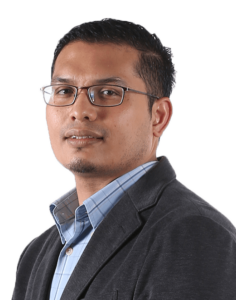
Assoc. Prof. Ts. Dr. Mohd Ibrahim Bin Shapiai
Ts. Dr. Mohd Ibrahim Bin Shapiai @ Abdul Razak currently works as an Assoc. Professor at Malay-Japan International Institute of Technology (MJIIT) of Universiti Teknologi Malaysia Kuala Lumpur. Prior to his current position now, he previously worked as a lecturer at Universiti Teknologi Malaysia main campus in Skudai, Johor from 2008-2014. As for his educational background, in 2004, he graduated with his diploma in Telecommunication Engineering at Universiti Teknologi Malaysia followed by his Master in Audio Signal Processing at the University of York, United Kingdom in the year 2007. Not only that, but he also completed his Ph.D. in Machine Learning at Universiti Teknologi Malaysia. His widely known expertise including Artificial Intelligence, Machine Learning, Brain Computer Interface, and Swarm Intelligence.
The presentation titled “AI on Cloud: An Application” offers a practical exploration of artificial intelligence, spotlighting computer vision, 3D modeling, and generative AI. It kicks off with a historical review, spanning the early days of AI’s promise to the challenging “AI winters” marked by setbacks and technical constraints. However, the landscape has shifted significantly with the advent of deep learning, ushering in a new era of AI and the emergence of generative AI as a standout feature. Notably, Large Language Models like ChatGPT take center stage, showcasing their capacity to not only predict but also generate content. The presentation delves into the core principles of Large Language Models, elucidating how they can be tailored for various applications using embedding and fine-tuning methods. Beyond theory, the talk highlights concrete applications of AI in the cloud, encompassing tasks such as monitoring assets on tall structures, livestock counting, semiconductor defect detection, and the development of AI-driven chatbots for natural and engaging interactions. “AI on Cloud: An Application” delivers a holistic perspective on AI’s evolution, illustrating its wide-ranging impact across industries, from enhancing productivity to reshaping creativity and human-AI interactions.
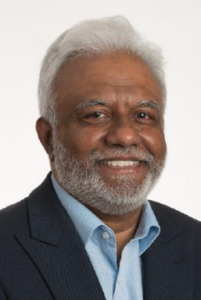
Prof. Saman Halgamuge
Prof Saman Halgamuge, University of Melbourne, Fellow of IEEE and IET, received the Dr.-Ing and Dipl.-Ing in data engineering from the Technical University of Darmstadt, Germany, and BSc Engineering degree from University of Moratuwa, Sri Lanka. He is listed as a top 2% most cited researcher for AI and Image Processing in the Stanford database. His previous leadership roles include Head, School of Engineering at Australian National University and Associate Dean of the Engineering and IT at University of Melbourne. He graduated 50 PhD students and mentored 16 postdoctoral fellows in Australia. His research funding includes Australian and International industry and government agencies and philanthropic foundations. His associations with Malaysia include visiting professorship of University Putra Malaysia (current), University of Malaya (one month) and external member of Research Advisory Committee of University of Technology Petronas (over three years). His associations with Indonesia include visiting professorship of ITB (current) and joint grants with University of Gajahmada and Universitas Indonesia and providing presentations on research strategy to several universities in Indonesia and to Directorate General of Higher Education, Research and Technology at the Ministry of Education, Culture, Research and Technology. He is a frequently sought after public speaker who delivered about 50 keynote speeches in the last 10 years. His 2023 keynotes include: 17th IEEM (Singapore), 22nd InCOB (Australia), 15th ACIIDS (Thailand), ITIS (Indonesia), AIBC 2023 (Japan) and MICML (China).
The presentation titled ” Can AI change the developing countries on Earth?” The 21 st century AI needs to be socially responsible and equipped with capabilities to face serious threats like dangerous epidemics and climate emergencies. Several major technical issues hinder the creation of such AI with democratized access that would bring most of this technology to almost all people on Earth specially for developing nations. AI used in applications evade regulations in most parts of the world. I will introduce these major technical issues of AI as well as the opportunities current AI can create for the developing world. My talk will focus on two groups of AI applications: well-known applications of AI of value to the planet including the developing world, e.g., Health, Agriculture, Energy, Transportation and Environment and specific applications of AI mostly useful to the developing countries.
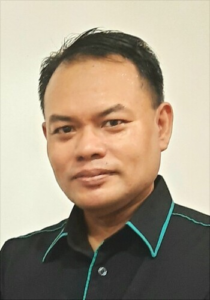
Prof. Ts. Ir. Dr. Ahmad Fadzil Ismail
Ahmad Fadzil Ismail (Senior Member, IEEE) received a B.Sc. in Electrical Engineering from Gannon University, Erie, Pennsylvania, USA in 1994, an M.Sc. degree in Telecommunication and Information Systems from the University of Essex, UK in 1996, and the Ph.D. degree in Electronics from the University of Bath, UK in 2000. He is currently working as a Professor with the Department of Electrical and Computer Engineering, Faculty of Engineering, International Islamic University Malaysia, Selangor, Malaysia. He is a Professional Engineer with a Practicing Certificate enlisted at the Board of Engineering Malaysia and a registered Professional Technologist with the Malaysia Board of Technologists. His research interests include the development of active and passive target tracking algorithms, radio frequency and wireless systems, and microwave and millimeter wave technology.
Associating creativity and efficiency using artificial intelligence (AI) can be a prevailing means to augment prompt productivity and innovation in various domains, such as technology, business, and even art. To realistically bridge creativity and efficiency with AI, it’s decisive to strike a balance that includes strategy. While AI can expedite processes and offer insights, it should also leave room for human intuition, critical thinking, and ingenuity. A strategy that advocates sustainability must be imbued in the process flow. What is more, ethical contemplations should guide the development and use of AI in all creative processes. This is a safeguard so that AI doesn’t stifle creativity or originality.
Organized by:
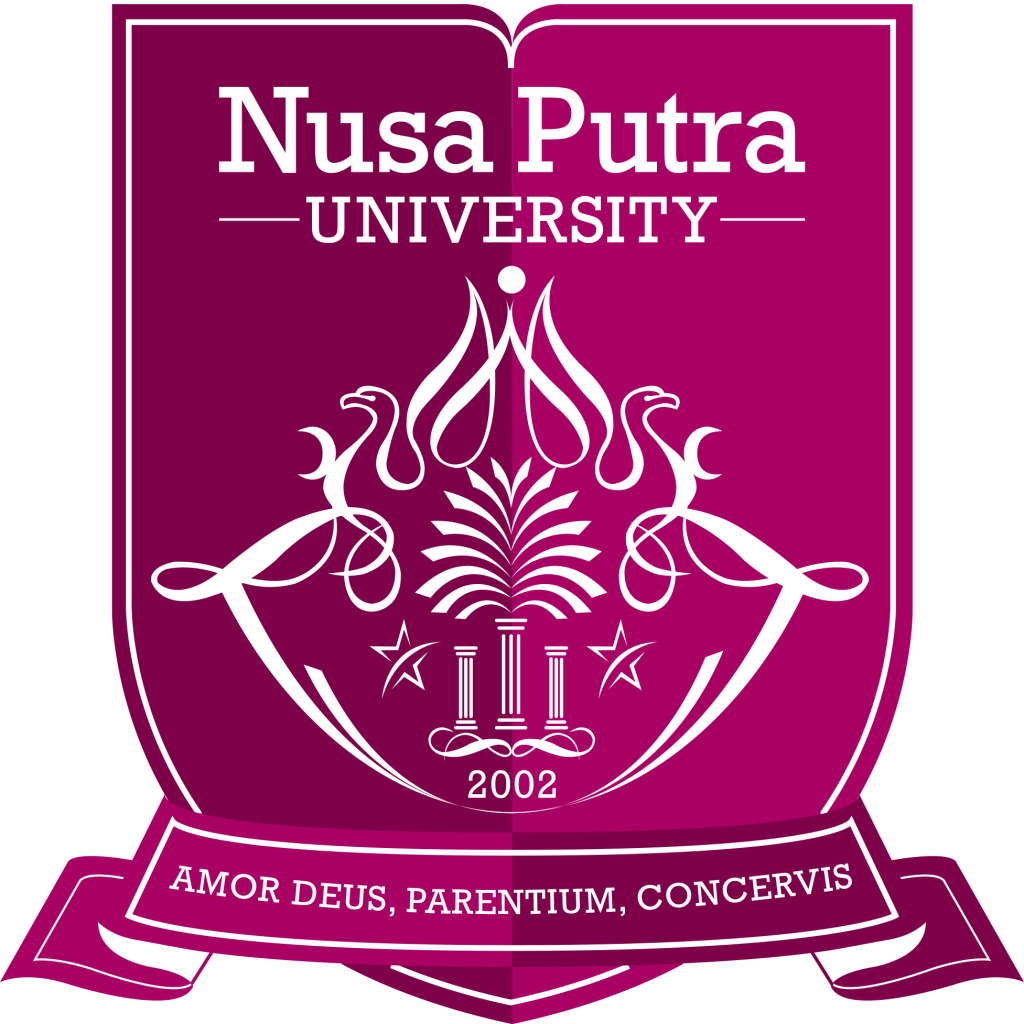

Co-Hosted by:
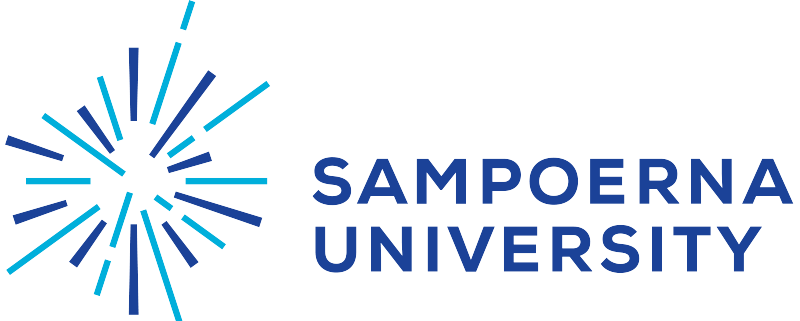
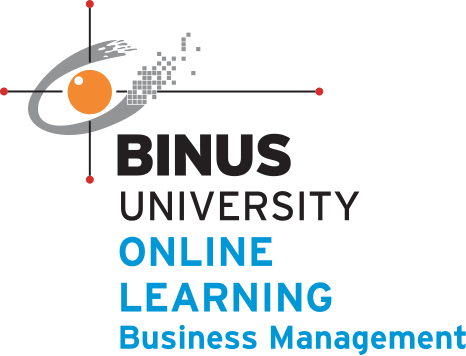
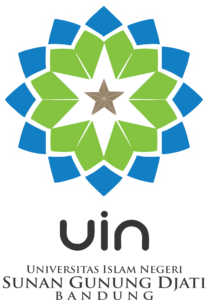
Co-Technically Sponsored by

